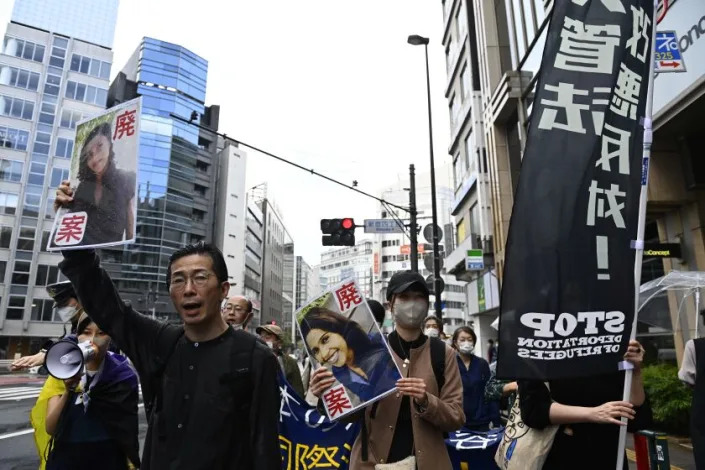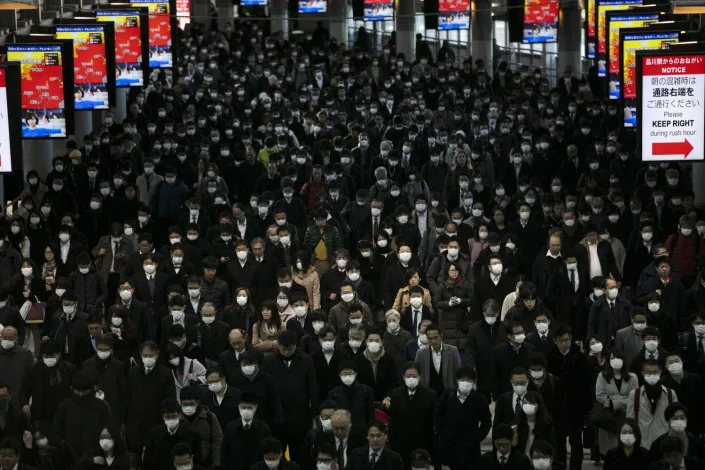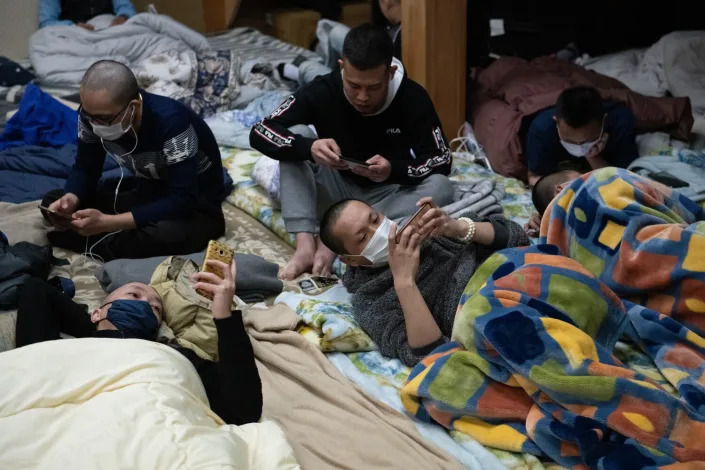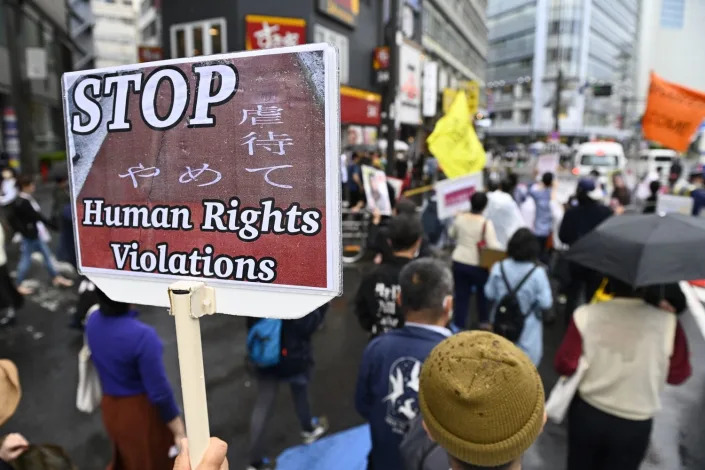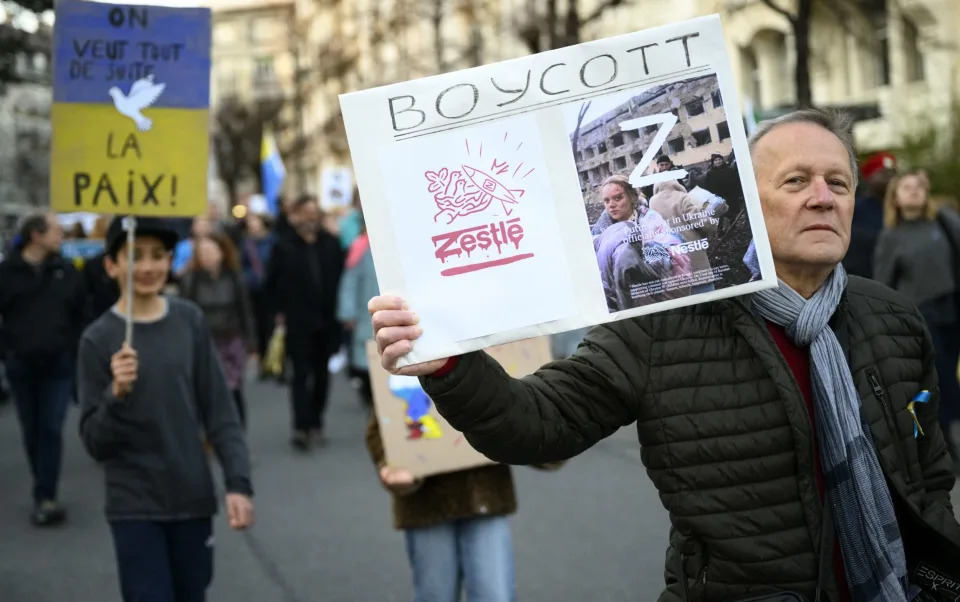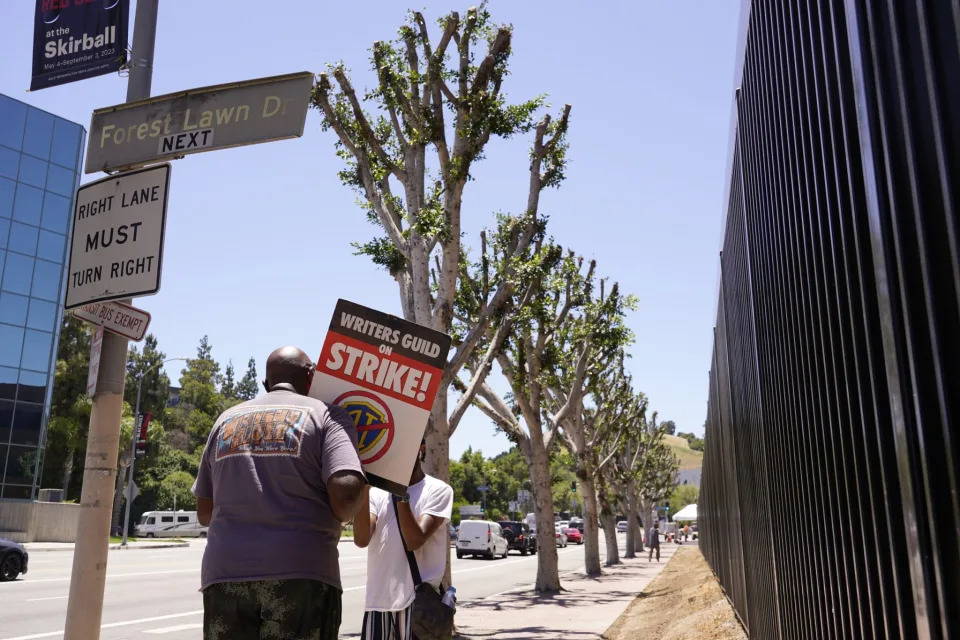INDIAManipur video: India parliament disrupted by protests over violence-hit state
BBC
Mon, July 24, 2023

A video of two women being paraded naked in Manipur has sparked national and global outrage
India's parliament was adjourned for a third day after opposition MPs demanded a debate on the violence in the north-eastern state of Manipur.
Angry MPs disrupted proceedings by shouting slogans and holding placards in both houses.
Home Minister Amit Shah said he was "ready to have a discussion" and blamed the Opposition for not allowing it.
But protesting MPs demanded that PM Narendra Modi should address the house on the issue.
Tensions have escalated in Manipur since May where ethnic clashes between the majority Meitei group and the tribal Kuki minority have killed more than 130 people and displaced nearly 60,000.
On Sunday, the US expressed concern over reports of a video that showed two women being paraded naked in the state.
The assault on the women took place almost three months ago but became public last week after the video went viral, sparking global outrage.
A US spokesperson called the incident "brutal" and "terrible", Reuters reported.
India is yet to comment on the statement. But earlier this month, the Indian government had responded sharply after a US official said that his country was "ready to assist" in resolving the crisis in Manipur.
Foreign ministry spokesperson Arindam Bagchi said that he had not seen the comments, made by US ambassador Eric Garcetti, personally but that foreign diplomats usually did not comment on India's "internal developments".
The video, which was first circulated on Thursday, shows two Kuki women being pushed around and groped by a mob from a village dominated by Meiteis.
India video shows how rape is weaponised in conflict
India police face scrutiny after women paraded naked
What is happening in Manipur and why?
It sparked widespread condemnation, leading to the arrest of six men. According to a police complaint, one of the women was gang raped. The complaint added that a third woman was also forced to strip but she is not seen in the video.
Questions are being raised about why it took police so long to act - the complaint had been lodged just days after the incident and many of the men are clearly identifiable in the footage.
After the video went viral, Mr Modi condemned the assault as "shameful" and promised tough action but he is yet to make a statement in parliament.
Protests also erupted in Manipur, where thousands gathered over the weekend demanding the arrest of men involved in the assault.
There have also been reports of Meities living in the neighbouring Mizoram state leaving for Manipur and Assam state after an organisation of former insurgents issued a "warning" about their safety.
However, the Mizoram government has assured the Meitei community of their security in the state.
On Sunday, the organisation also clarified that its statement was not a warning, but an "advisory requesting Meities living in Mizoram to exercise caution in the light of the public sentiments".
Manipur assault video emboldens women to speak out
Divya Arya - BBC World Service, Manipur
Mon, July 24, 2023

Kuki nursing student Chiin Sianching was dragged out of her room, beaten and left for dead
New allegations of violence against women are emerging in the north-east Indian state of Manipur, as the response to a viral video showing two women being paraded naked by a mob encourages others to speak.
Warning: This article contains details some readers may find distressing.
For more than two months, Mary (not her real name), a Kuki woman, could not find the courage to go to the police.
Her 18-year-old daughter had been abducted from outside their home, gang-raped overnight and left badly beaten on their doorstep.
"The attackers threatened that they'd kill my daughter if she spoke about it," Mary told me when I met her outside the relief camp where they have been living since ethnic clashes broke out between the Meitei and Kuki communities in Manipur in May, claiming more than 130 lives.
Then something changed.
A video of two Kuki women being paraded naked by a mob emerged last week on social media.
There was widespread outrage and condemnation, leading to the arrest of six men.
This prompted Mary to make a police complaint.
"I thought if I don't do this now, I won't get another chance." she says. "I will always regret that I didn't even try to get my daughter's attackers punished."
Mary says that her daughter now talks about killing herself, but that she reassures her she can still make something of her life.
Nineteen-year-old Chiin Sianching fears she could easily have met a similar fate.
She and a friend were singled out for belonging to the Kuki community, she says, and attacked in the hostel they lived in while studying nursing in the state capital, Imphal.
"The mob kept banging the door of the room we were hiding in, shouting that your men have raped our women, now we will do the same to you," she says.
She called her mother to say that it could be the last time that she would speak to her. Minutes later the two young women were dragged out on to the street and beaten unconscious - Ms Sianching thinks the mob thought they were dead, so ran away.
Police who found their bodies only realised they were alive after checking their pulses.
Honour and shame
Fake news on social media, purporting to show women being sexually assaulted by Kuki men were fuelling this mob of Meitei men against Chiin and her friend.
Early in the conflict a photo of a dead woman was circulated, apparently showing a Meitei nurse who had been raped and killed by Kuki men. Later, many news outlets debunked this.
Faultlines quickly deepened after the conflict flared up, causing a complete separation of two communities who had previously lived alongside one another. Both now have barricades at village entry points and there are continuing reports of overnight clashes.
Meitei groups have told the BBC that women from the community also faced sexual assault - the BBC has not been able to confirm this. But the video of the two Kuki women being paraded naked united Meitei women in protest too.

Sinam Surnalata Leima, a Meitei women's leader, condemns the attack on the Kuki women as a "heinous crime"
Manipur has a longstanding tradition of women playing a powerful role in civil society, among them the Meira Peibis, or torch-bearers - also known as the mothers of Manipur - who have protested against abuses of power by the state and the army, and human rights violations.
Sinam Surnalata Leima, who leads the Meira Peibis in a group of villages where the two Kuki women in the video were attacked, says that villagers themselves handed over the main suspect to police.
Then the local members of Meira Peibis got together and burned his house.
"The burning is a symbol of the community's condemnation of the heinous crime that those men committed, their actions cannot tarnish the whole Meitei community's honour," says Ms Leima.
The accused's wife and three children have been banished from the village.
But why did the mob act the way it did, in a society that regards its women highly?
What is happening in Manipur and why?
"It was grief and revenge for the Meitei women who had been attacked by Kuki men," Ms Leima reasons.
She does not personally know of any such attacks, but says Meitei women would not discuss a crime of this kind, as it would be considered shameful.
State police said soon after the start of the clashes that they had not received reports of violence against Meitei women, but a spokesman for the Meitei community told me there had been many unreported attacks.
Khuraijam Athouba, who represents a Meitei organisation called Cocomi, said that Meitei women had chosen not to speak about the "violations they faced".
In his view the focus should remain on the issue of killings and displaced people, rather than sexual violence.
Justice
The brother of one of the Kuki women who was seen paraded in the video is tormented by all of these issues.
The mob that stripped and sexually assaulted his sister, also killed their father and their younger brother - he and his mother were saved as they were visiting family in another village when the clashes started.
The 23-year-old man has a blank expression for most of the time when I meet him in a small room in the home of one of his relatives.
I ask him what he would like the government and police to do?
"Arrest each person in that mob, especially those who killed my father and brother," he says.
"And treat both communities with fairness."

Gracy Haokip: "If it wasn't for this video, we wouldn't have got so much attention"
Faith in the federal and state government seems lacking in both communities.
The Chief Minister of Manipur, N Biren Singh, who belongs to the Meitei community, promised the "harshest punishment to the accused, including capital punishment". But when asked about the calls for his resignation for failure to resolve the conflict, he said, "Don't want to go into this, my job is to bring peace to the state and punish miscreants."
Prime Minister Narendra Modi broke his silence on the conflict only after the video of the two women sparked national outrage.
"What happened with the daughters of Manipur can never be forgiven," he said, adding that no guilty person would be spared.
But for Ms Leima, that statement painted her community in a bad light and ignored the violence that has raged since May, causing 60,000 people to be displaced.
"The prime minister spoke when Kuki women were attacked. What about everything we have been facing, are we Meitei women not citizens of India?" she asks.
The video has put the spotlight back on the continuing Manipur conflict.
"If it wasn't for this video, we would have not got so much attention from the government and other political parties," says Gracy Haokip, a researcher supporting victims of the clashes, including the nursing student, Chiin Sianching.
She says it will help the survivors who have courageously shared their experiences while trying to rebuild their lives.
Chiin tells me about the speech she gave to the women in her community, when she told them that she had enrolled into another nursing institute situated in her local area.
"My mother told me that God has kept me alive for a reason, so I have decided I will not give up my dreams."
Powerful Indian women seek reprisals over 'heinous' abuse video
Aishwarya KUMAR
Sun, July 23, 2023

Women from the Meira Paibis group of the Meitei community in India's Manipur state gather in front of the partially burned house of a man accused of abusing two Kuki women after a video of the incident emerged (Arun SANKAR)
Gender trumped tribe for a group of furious Indian mothers who torched the homes of two men from their own community who were accused of abusing women in a video that sparked outrage.
At least 120 people have been killed during months of ethnic conflict between the predominantly Hindu Meitei majority and the mainly Christian Kuki in India's troubled northeastern state of Manipur.
The women from the Meitei community decided to show their anger after the humiliating video surfaced on Wednesday, which reportedly shows two Kuki women being forced to strip naked and then jeered at and harassed by Meitei men in May.
Police arrested four suspects on Thursday but, on the same day, a powerful group of Meitei women known as the "Meira Paibis", or the Mothers of Manipur, set out to burn the homes of two of the accused.
"We condemn the violence against the women and that is why we want capital punishment," Sumati, who gave only her first name, told AFP.
"That is why we destroyed his house."
India is generally traditionalist, conservative and patriarchal but the Meitei have a history of women's activism, with women having a more prominent role in society than elsewhere.
Tens of thousands of people have fled to government-run camps since the violence erupted in May but the video clip has shone a spotlight on the conflict.
- 'Shamed India' -
Indian Prime Minister Narendra Modi said after the video clip emerged that the incident had "shamed India".
Manipur's state government is led by Modi's Hindu nationalist Bharatiya Janata Party and has said it is investigating the "heinous" incident.
"Both communities are condemning this event," said Suchitra Rajkumari, 42, a local activist. "At least in one point they are agreeing."
The Meira Paibis smashed down the walls of the homes of two of the accused before stuffing bales of hay inside and setting them on fire.
Thangjam Lata Devi, the mother of one of the accused, was told she had given birth to a "spoilt" son. Her home was also torched.
"If they decide to exile you, then that's it," she said.
The Meira Paibis said the homes were burned to send a message.
"We condemn what happened to the women," said Sumati, who helped set fire to one of the houses.
"The accused and their family will not be able to live in their village. That is why we destroyed the house."
The Kuki oppose Meitei demands for reserved public job quotas and college admissions as a form of affirmative action, stoking fears that they might also be allowed to acquire land in areas currently reserved for tribal groups.
Human Rights Watch alleges the policies "promote Hindu majoritarianism".
- Vigilante justice -
But just as Meira Paibis vigilantes administer their form of justice, they have also protected their men.
Some 500 women blocked roads to stop about 100 armed police arresting another suspect linked to the video on Saturday, jeering at security forces in a three-hour standoff.
"Kill us! Take us all!" the women screamed, brandishing burning torches. Their faces were smeared in toothpaste, which they say helps protect against tear gas.
This time, they alleged the men the police wanted to arrest were not responsible and the officers left empty-handed.
The group has blocked roads to bar security forces multiple times during the unrest, accusing the army of being biased towards the Kuki.
"We have a legacy of protecting our people and that gives us inner strength," said Meira Paibis member Matouleibi Chanu.
The Meira Paibis launched dusk-till-dawn patrols after the violence erupted, hammering on electricity poles to raise the alarm.
The army said in June they were forced to release 12 Meitei militia members after troops were surrounded by a 1,500-strong "mob" of women.
"We will do everything to protect our people," said 60-year-old Chongtham Thopi Devi, another Meira Paibis member.
Police said in a statement on Saturday that six arrests had been made in connection with the video and they were conducting "raids" for other suspects.
"We can't use the same force as we do in dispersing men," a senior police officer said, asking not to be identified because he was not authorised to speak to reporters.
"We often find men hiding behind these women in protests and marches... the women lead always."
ash/pjm/pbt








